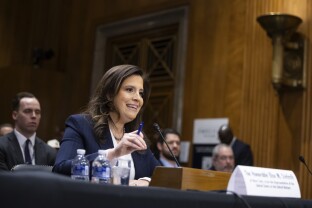Democrats on the Senate Committee on Foreign Relations seemed broadly supportive of Rep. Elise Stefanik, President Donald Trump’s nominee for United Nations ambassador. But questions about her future boss’ executive actions and the administration’s commitments around the globe took up most of the time during her confirmation hearing Tuesday.
While Republicans and Democrats alike praised Stefanik’s record in the House and qualifications for the role, some of the tensest exchanges came over the actions Trump took in his first 24 hours to withdraw the U.S. from international institutions, including the World Health Organization and the Paris climate agreement. In another executive order yesterday, Trump initiated a 90-day pause in foreign assistance for a review of all foreign development assistance.
Stefanik was quick to stand by the orders.
“I think President Trump is the strongest commander in chief, in terms of he knows when to negotiate and he knows when to walk away when organizations are counter to our national security or counter to American interests,” she said.
Stefanik broadly supports U.S. involvement in the U.N. and said Trump has voiced the same to her — as long as it aligns with his agenda. She told the committee she wants to conduct a full review of U.S. contributions to the U.N. to find places where “American values” aren’t being upheld.
Democratic Sen. Brian Schatz raised concern about Trump’s first executive orders and appealed to Stefanik to help nuance them, acknowledging the “absolute prerogative” that a new president has to make immediate changes.
“We don’t have 90 days when it comes to our military partnerships, people don’t have 90 days when it comes to humanitarian assistance,” Schatz said.
Stefanik didn’t commit to trying to shorten that timeline, but she said she was confident that “the president is going to make sure that we have all the tools we need to protect our national security.”
Republican Sen. Jim Risch, the chairman of the committee, added that executive orders can be amended if “unintended consequences” make it necessary, so he’s “not concerned” about the fallout of that order. Newly confirmed Secretary of State Marco Rubio also has the power to waive the pause for certain programs.
Most Democrats made clear their support for Stefanik’s nomination, and she’s expected to have one of the smoothest confirmations among Trump’s cabinet. But the role will largely serve as a liaison between Trump and an institution of which he is a critic.
Sen. Chris Coons said he was concerned about the 90-day foreign aid pause, noting that it doesn’t lay out what exactly will be halted, and he urged Stefanik to get specifics.
“Does that include our contributions to UNICEF and the World Food Programme, which I think you would recognize, you did recognize, [are] led by Americans, broad bipartisan support, part of the key mission at the U.N. to promote stability and security by feeding hungry people and bringing stability?” Coons asked.
Stefanik took a moderate approach during the hearing. She repeatedly acknowledged the U.N. agencies she sees as “successful,” like UNICEF and the WFP. She also agreed with Democrats and Republicans that the United States’ seat at the global table is important to counter growing Chinese influence in the U.N.
As far as Trump’s withdrawal from the WHO, Sen. Chris Murphy called it a “mistake” and asked Stefanik to articulate how the U.S. can remain a leader in global public health without the WHO.
“Can you commit to this committee, notwithstanding the decision to leave WHO, that you’re going to make sure we find a way to have impact on the global stage when it comes to global public health?” Murphy asked.
Stefanik responded that she supported the president’s decision and that she was committed to U.S. health leadership, including through U.N. agencies.
—
Helen Huiskes is a NOTUS reporter and an Allbritton Journalism Institute fellow.
Sign in
Log into your free account with your email. Don’t have one?
Check your email for a one-time code.
We sent a 4-digit code to . Enter the pin to confirm your account.
New code will be available in 1:00
Let’s try this again.
We encountered an error with the passcode sent to . Please reenter your email.


